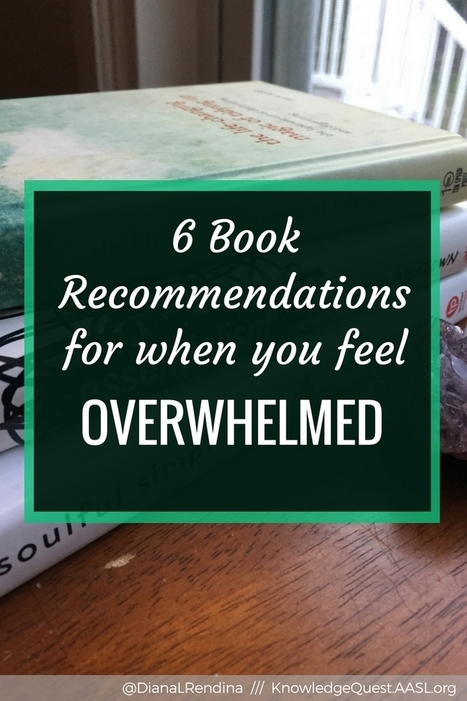 Your new post is loading...
 Your new post is loading...

|
Scooped by
John Evans
|
On New Year's Eve, back in 2012, Savannah Eason retreated into her bedroom and picked up a pair of scissors.
"I was holding them up to my palm as if to cut myself," she says. "Clearly what was happening was I needed someone to do something."
Her dad managed to wrestle the scissors from her hands, but that night it had become clear she needed help.
"It was really scary," she recalls. "I was sobbing the whole time."
Savannah was in high school at the time. She says the pressure she felt to succeed — to aim high — had left her anxious and depressed.
Currently, schools are being inundated with cases of anxiety in young adults. Although the dramatic increase in attention being paid to the illness has been beneficial to those suffering, the diffi…
Via Tom D'Amico (@TDOttawa)

|
Scooped by
John Evans
|
In news that will surprise no teachers, a new study has found that 93 percent of elementary school teachers experience high levels of stress. But schools can mitigate the harmful effects of stress by providing proper supports, highlighting the importance of a holistic approach to teacher well-being.
In the study, researchers from the University of Missouri surveyed 121 elementary school teachers, asking questions such as, “How stressful is your job?” and “How well are you coping with the stress of your job right now?” Teachers reported on their levels of burnout and cynicism and on feelings of accomplishment and self-efficacy—their belief in their ability to be effective teachers.

|
Scooped by
John Evans
|
While many educators now recognize that “noncognitive” factors that affect how a student thinks about his or her abilities are important to learning academic content, there’s little consensus about how teachers can help build those qualities. Some districts are trying to include noncognitive factors in measures of school effectiveness, while other schools focus on certain character qualities as part of their mission.
Educators are trying to figure out how to motivate students to work hard in school and to help them see the rewards for that hard work as a real possibility. But that work is particularly challenging as the public school population becomes increasingly low income and children often come to school having experienced chronic stress or trauma in their home lives that significantly impact their ability to regulate emotions, focus, and deescalate situations.

|
Scooped by
John Evans
|
Eight in 10 teenagers identify school as a primary source of stress, and one in 10 say they’ve received lower grades because of stress. When it comes to math, the problem may be worse—many students experience math anxiety, low self-confidence, or overwhelming amounts of academic pressure, which can disrupt learning, leading to lower grades and test scores. Teachers try out a lot of ideas to reduce math stress, and here’s a surprising one: Have students write about their personal values. That’s the finding from a new study published in PLOS One.
|

|
Scooped by
John Evans
|
We've all had the experience of studying hard for a test, believing we know the information, and then sitting down in the testing room only to draw a blank. Why does that happen?
In this TED-Ed video, Elizabeth Cox explains there are many kinds of stress and many kinds of memory, but short term stress can affect a person's ability to recall facts. There are three basic steps to learning new information: acquisition, consolidation and retrieval. Moderate stress related to the memory task itself can actually have a positive affect on the acquisition and consolidation phases. The brain releases corticosteriods when stressed, which prompt the amygdala to tell the hippocampus to consolidate a memory. The stress signals to the brain that the information is worth remembering, but other emotions can be equally helpful to encode memories.
School life can often get hectic, as you juggle between classes, assignments, projects, good grades, all laced with extreme competition, constant up gradation, and race for perfection. It is therefore, not uncommon for students to go through phases of stress and anxiety, as they surf through their learning journeys. It’
Via Tom D'Amico (@TDOttawa)

|
Scooped by
John Evans
|
It can be so easy to get caught up in the rat race of life and find ourselves constantly busy. Especially for educators. Even more so for school librarians who have a billion-and-one things on our plates on any given day.
For me, the end of the school year has always been the most hectic time. Standardized testing. End-of-the-year collection inventory. Panicked students needing help with citations ten minutes before a term paper is due. Yeah, I’ve definitely experienced overwhelm at this time of year.

|
Scooped by
John Evans
|
"Adversity and trauma reside in our biology, not our psychology and cognition, so we educators need to prime students’ brains for learning. This calls for a deeper understanding of how our brains develop and how they respond to adversity and trauma, and how building relationships and providing strategies that promote emotional regulation can positively affect students’ emotional, physiological, and cognitive health.
I’d like to describe some practices that not only address the stress response in the limbic brain areas, but also attend to sensory and motor systems in the brain stem area. Often these systems are compromised because of chronic stress that has neurobiologically reprogrammed how the brain of a child or adolescent responds to adversity."

|
Scooped by
John Evans
|
In order to foster a sense of resilience and encourage healthier ways to cope with life, we need to educate young people about natural highs. Over the past decade, neuroscience research has shown that exercise, meditation, positive social support, laughing, and many other factors can elevate mood and improve brain functioning. These activities don't require putting a chemical into your body, but they do take time and effort to have an impact.
|
 Your new post is loading...
Your new post is loading...
 Your new post is loading...
Your new post is loading...



















